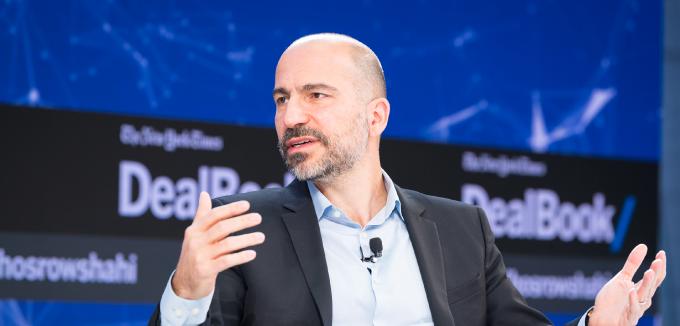
06/06/2018
Dara Khosrowshahi How Uber wants to conquer Germany in the second attempt
Getty Images for The New York Times
Uber boss Dara Khosrowshahi
The US-Fahrdienstvermittler Uber continues to conquer the European market – and is purified. Instead of being an aggressive competitor to the taxi industry, Uber wants to establish itself in Europe as an integrative mobility platform that relies on electromobility and works together with the cities.
“We want to help people get from one place to the next,” said Uber CEO Dara Khosrowshahi, explaining the concept on Wednesday at a technology conference in Berlin. In addition to cars and bicycles, carpools, taxis, and in future possibly even train services, should be integrated into the Uber offer.
Uber wants to become a mobility platform – the “Amazon of transport,” he said. “For us, cars are what the book was to Amazon.” A claim that the Daimler mobility platform moovel had already registered years ago – but not really aggressive propulsion.
Uber also wants to distribute electric cars and bicycles in the cities
How green Uber can be, the group wants to prove this year in Berlin. For example, Uber wants to distribute the bicycle bike service Jump, which he has taken over, in the city in 2018. And also the electric car service Uber Green should start in the next few months. In London, Uber wants Khomrowshahi to change his entire fleet to electric mobility by 2025.
manager-magazin.de
Taxi drivers protest against Uber in Berlin
And also on the image of exploitation, with which Uber was constantly confronted in Europe, the group wants to do something under new leadership – at least in Europe. In the future, workers in Europe will be offered free insurance coverage through cooperation with the French insurer Axa, which will also cover illness and maternity protection, as Khosrowshahi explained.
Uber had landed under Khosrowshahi’s predecessor Travis Kalanick among other things because of aggressive expansion policies, sexual harassment and a data scandal in the headlines. In Germany, taxi centers from several major cities have sued the offer for private drivers because the drivers and Uber have no permission to carry passengers.
“We had a very bad start in Germany”
Also on Wednesday, about 40 taxi drivers demonstrated again in front of the Berlin Tempodrom, where the Uber boss presented his plans at a tech conference.
“We had a very bad start in Germany,” Khosrowshahi said on Tuesday. Now it’s about building the business “right”.
For this reason, Europe – and especially the German market – is enormously important because of its sheer size. From China and much of Southeast Asia, Uber had largely withdrawn and left the market to competitors such as Didi Chuxing and Grab.
In its reorientation, Uber intends to adapt to local conditions in the future and work closely with the cities, emphasized Khosrowshahi. “We will take the sensitivities of the individual cities seriously,” he asserted. A one-size fits-all model does not work here.
Completely uncritical on the German regulatory policy, the native Iranian Khosrowshahi then but not. The so-called return obligation, which obliges Fahrdienste contrary to taxis to the return to its starting point, before they can accommodate new passengers, is “total Treibstoffverschweundung” criticized the Uber CEO.
A criticism that he shares with many other car service providers. Unlike his predecessor Kalanick, Khosrowshahi was patient. “You can not expect change overnight,” he said.
Related articles
more on the subject
© manager magazin 2018All rights reservedReproduction only with the permission of manager magazin Verlagsgesellschaft mbH

